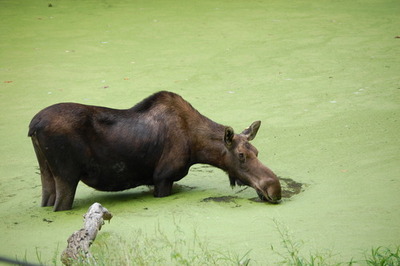Trend Analysis with Multiple Management Variables on Gastrointestinal Health in Zoo-managed Moose (Alces alces)
 Tuesday, April 14, 2020 at 01:00PM
Tuesday, April 14, 2020 at 01:00PM
Abstract submitted by Alexandria Armeni from the University of Minnesota
Alexandria A. Armeni1*, Rachel Thompson DVM, Dipl ECZM (ZHM)1,2, Diana Weinhardt3, Trista Fischer3, Snigdhansu B. Chatterjee PhD4
1The University of Minnesota College of Veterinary Medicine, Saint Paul, MN 55108 USA; 2 Species360, Bloomington, MN 55425 USA; 3Minnesota Zoo, Apple Valley, MN 55124 USA;4The University of Minnesota College of Liberal Arts, Minneapolis, MN 55455 USA Abstract Moose are recognized to be difficult to maintain under human care in zoos, mainly due to their particular digestive physiology and resulting feeding demands1. A syndrome classified as “complex wasting syndrome” has been described in literature as a gradual process in which damage to the intestinal tract accumulates until the body can no longer compensate for that damage. Common manifestations of this syndrome are poor fecal consistencies and chronic weight loss2. This study aimed to investigate the “complex wasting syndrome” by retrospectively evaluating trends in fecal scores as they compare to grain, browse and supplements fed, as well as temperature and housing parameters. To maintain consistency, data was entered into a template created in the Species360 Zoological Information Management System Care and Welfare module. Following common themes in literature, we hypothesized that grain, browse, and temperature would have a significant impact on fecal consistency scores, which are an indicator of gastrointestinal health in captive moose. Preliminary trends from the data suggest that the most significant factors were alfalfa, woodchips and seasonal behavior trends. Grain and temperature appear to have no significant effect on fecal score. Due to nutritional challenges observed in moose under human care, projects like this are of key importance for moose welfare. The successful display of healthy moose depends on improving their husbandry in zoos. This project has the potential to target areas critical for improving moose management. ACKNOWLEDGMENTS The authors would like to thank Minnesota Zoo, Species 360 and The University of Minnesota for their assistance in the collection and organization of the data for this project. LITERATURE CITED 1. Shochat, E., Robbins, C. T., Parish, S. M., Young, P. B., Stephenson, T. R., & Tamayo, A. (1997). Nutritional investigations and management of captive moose. Zoo Biology, 16(6), 479–494. 
 Moose,
Moose,  Students in Research,
Students in Research,  research in
research in  Cases/Abstracts,
Cases/Abstracts,  News
News 